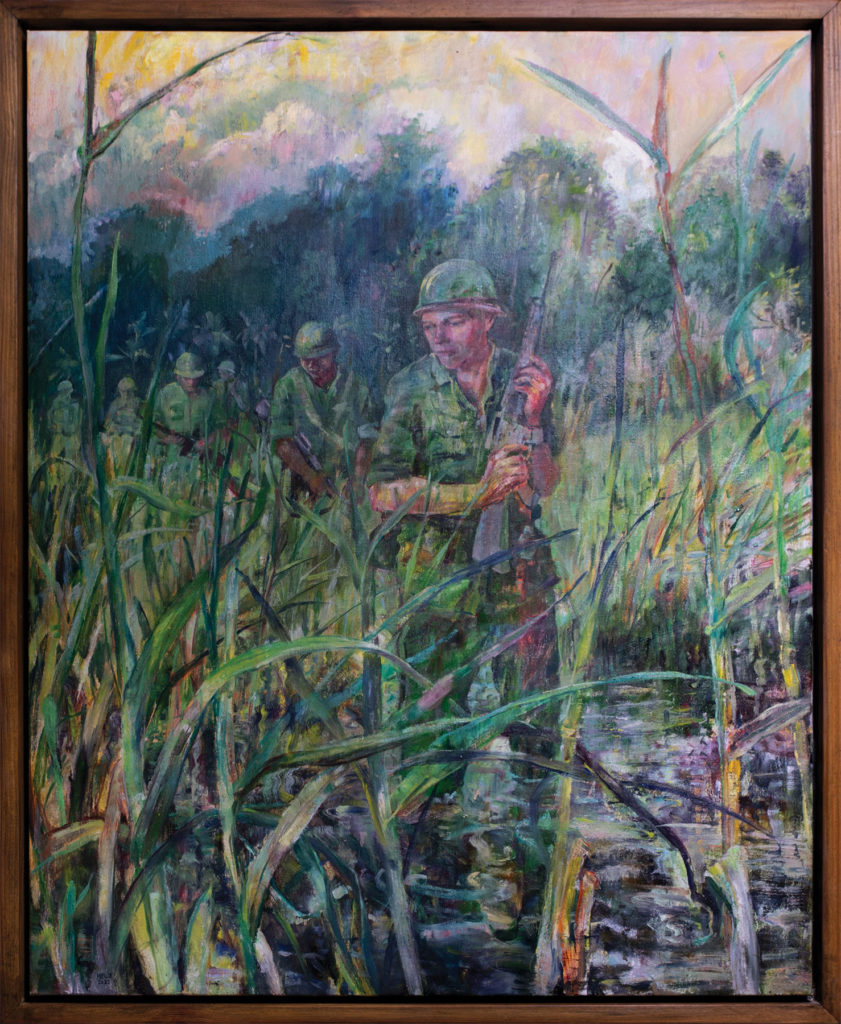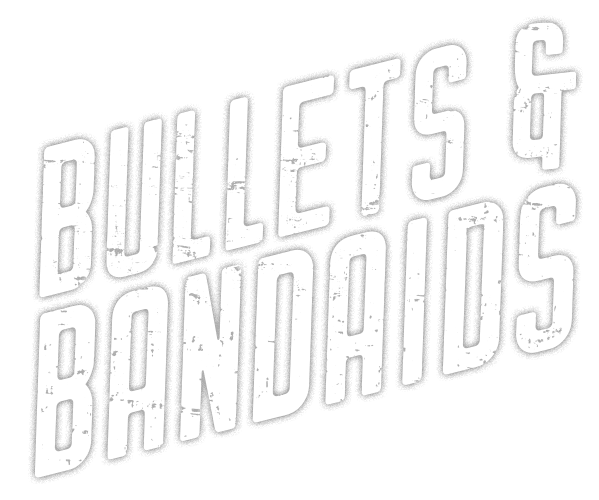
Michael Ross
28″ x 35″ • Oil on canvas
Artist Statement
Reading Tim Minnick’s impressions from Vietnam, ca. 1969, and also sorting through photographs and films from the Vietnam War, I was struck by a common thread: the grass itself. Grass weaves through so many of these accounts and photos. Grass swirled as helicopters landed to drop men into faraway combat zones, and it swirled again when helicopters came to extract the dead and wounded. Soldiers marched and crouched through it. Minnick describes the razor sharpness of the blades of grass, and in photos you can see each leaf structure is easily 4 feet long and the full plants taller than a man. The enemy could hide there. Anywhere in there. In my painting, the grass and the muddy ground act as a visual metaphor — a metaphor for the fear and hostility embedded in the landscape itself, and for the vulnerability of the young men who were asked to march through it.
Instagram: @michaelrossart
Facebook: michaelrossart
by Ted Minnick
The next time you see a person wearing a hat bearing the words Vietnam Veteran tell him “Thank you—Welcome Home”. He might say “thank you” or “it was my honor”–but be prepared for the glassy eyes, the 1000-yard stare or even tears as he tells you he has been home fifty years and no one has said that to him before.
If you ask him when he was there, he might say 68,69,70—but be prepared for those glassy eyes, the 1000-yard stare or maybe a tear or two as he says just last night and sometimes every day.
If you ask him what he did or his MOS, he might say he was a grunt or artillery or a clerk or a truck driver—but be prepared for those same reactions as he says what he was trained to do—Kill– and he was good at his job or, he spent his days hacking thru the jungle, with bleeding arms from the elephant grass, wading streams and rice paddies with leeches attached all over his body, or hunkering down in a foxhole half-filled with water during the monsoons where it rained so hard it was horizontal, sometimes scared shit-less while on guard duty, or looking and listening for the whop-whop of the helicopters coming to medevac or extract them.
If you ask him how his family is, he might say they’re good—but be prepared for those glassy eyes, the 1000-yard stare or maybe a tear or two as he says “I don’t know. They haven’t spoken to me or reached out to me in years—they think I’m a monster who can’t deal with reality or society with all of my pent-up rage and demons that no one seems to have an answer for but they sure have a name for it—PTSD–post-traumatic stress disorder or syndrome.” And the doctors just prescribe another medication to take.
If you ask him where he lives he might say Black Mtn, Asheville or Swannanoa—but be prepared for those glassy eyes, the 1000-yard stare or a tear or two as he says in a closet or in a box under the bridge or on the street going from corner to corner and rescue missions looking for a warm blanket or a shower or a free meal—that’s how he spends his days and nights.
If you ask him how he is feeling, he might say “I’m good”—but be prepared for those glassy eyes, the 1000-yard stare or maybe tears as he says his arms and shoulders hurt from swinging that machete cutting jungle or he might say his back hurts from carrying that 60-80 pound ruck filled with all his worldly possessions or his legs and knees hurt from humping that jungle or up and down those central highland mountains or slogging thru those rice paddies. He might even mention that he can’t hear because of the small arms fire or artillery or mortar and rocket explosions.
If you ask him if he wants a cup of coffee he might say “sure”—but be prepared for the glassy eyes, the 1000-yard stare or maybe a tear or two as he tells of hunkering under a poncho with a canteen cup full of rice paddy water, a packet of c-ration instant coffee being heated by a piece of C-4 explosive cut out of a claymore mine, shooting the bull with his buddies who are no longer here– but he remembers all their names and where they are located on the Vietnam Veterans Memorial Wall in Washington and that they visit him every night.
You might be bold enough to ask him his age as you look at his ragged, dirty clothes, his scraggly beard and his long, oily hair and he might say 70 or 75—but be prepared for the glassy eyes, the 1000 yard stare or the tears as he tells of spending his 18th or 19th birthday walking point on an ambush patrol in that same dark, triple-canopy jungle or wading those rice paddies in 100 degree heat and 100% humidity and how, during a break he and his buddies, who are no longer here, shared a small can of c-ration pound cake drenched with a small can of c-ration peaches or maybe a box of crumbled, smashed chocolate chip cookies that his Mom sent him. He might even mention having to eat cold chopped ham and eggs or ham and limas (frequently called ham and m-f’ers), or scraping the congealed oil and fat out of his c-ration beans and franks.
You might ask him when was the last time he had a bath and he might say “I don’t know” or “the last time it rained”—but be prepared for the glassy eyes, the 1000-yard stare or the tears as he tells of wearing his uniform and boots until they rotted off of him or stopping to rinse off in a stream with those same leeches and using a towel to dry with that hasn’t been dry in weeks.
If you have this conversation with him, he might give you the short answers—but be prepared for those glassy eyes, the 1000-yard stare or the tears because you might be the only person that has taken the time to see him, to understand what he is talking about, or maybe who has lived those same horrors and experiences of combat—the one person who gets it. As you try to relate to this, consider this quote from Brian R. B. Napier: “There is no glory in war, there is no color. There is only shadows, darkness and death. And it should be the will of all good men to find the solution whereby, no man should ever cast those shadows of death upon another.”
And you might be the one person who really wants to know and he realizes that and finally opens up about what he has been through and his life after the war–how he lived a lifetime during one year of combat in the jungles and rice paddies of South Vietnam..
So when you take the time to actually see that veteran and ask all these questions and those glassy eyes show up, the 1000-yard stare shows up and the tears begin to fall, bring 2 chairs because he might finally tell the truth to someone who is the one person that has shown a genuine interest in what he has to say and what he has endured.
Richard “Boon” Preston, a friend and fellow Vietnam Veteran Brother once said “At the end of slumber, there still be dragons”.
